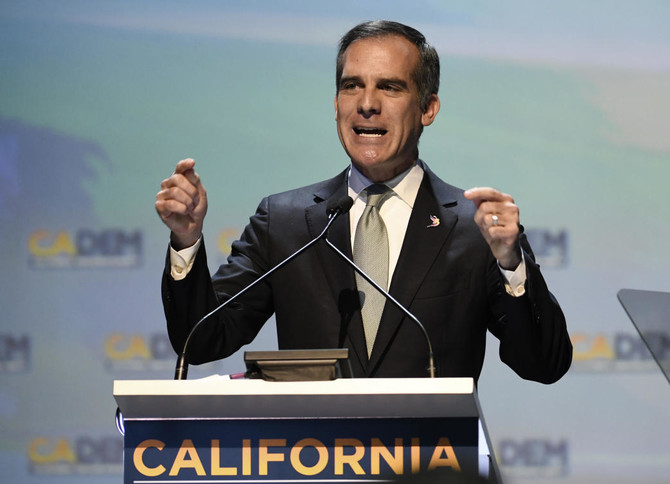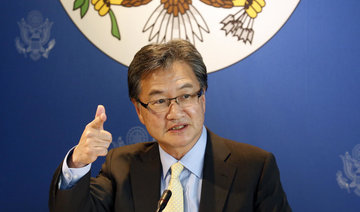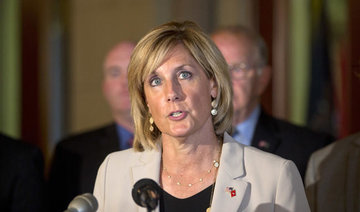WASHINGTON: Republicans spent much of the last decade firing up their base with a vow to repeal President Barack Obama's health care overhaul. But when it came to doing the deed, they found promises much easier than execution.
Democrats may be starting down the same path on taxes.
From New Mexico to New York, high-profile liberals are calling for the repeal of the Republican tax plan that President Donald Trump signed into law just two months ago. They're betting big that the message will resonate with voters in the midterm elections in November and provide the sort of clear, populist economic message some Democrats worry has been missing. But others, including red-state Democrats, are clearly queasy about the strategy, mindful that repealing a government benefit once it takes hold is far easier said than done — and not always popular.
When pressed, some leading Democrats conceded that they'd repeal only certain portions of the tax law despite the implication that they'd go further.
Vermont Sen. Bernie Sanders, a 2016 presidential candidate who appeared last weekend in Iowa, Wisconsin and Michigan as part of the "Repeal the Trump Tax" national tour, said "No" three times in an AP interview when asked whether he backed full repeal.
"I think what we have got to do is sit down and take a look at what kind of tax benefits would work best for small business, for working families and the middle class," Sanders said. "But what we must repeal completely is tax breaks that go to billionaires and to profitable large corporations that are in some cases are paying very little in taxes right now."
Los Angeles Mayor Eric Garcetti, who may seek the Democratic presidential nomination in 2020 and was also featured on the repeal tour, offered a more aggressive position.
"Repeal this tax bill," Garcetti said. "It was passed by, and for, the Washington crowd and their rich friends. Corporations and billionaires are doing just fine."
The messaging challenge comes as the Republican tax overhaul emerges as a central issue in this year's midterm elections. More than health care, guns, or immigration, Republicans and Democrats both have embraced the tax debate. Each side believes it has the winning argument in a battle that will decide the balance of power in Washington for the last two years of Trump's first term.
The conservative Koch brothers' political network has already begun spending millions of dollars on TV ads and grassroots events to help improve the plan's popularity.
While Trump and many conservative leaders cheered the tax overhaul, it was among the least popular pieces of legislation in modern history when it became law in December. Not a single Democrat in the House or Senate voted for the tax plan, which overwhelmingly benefited the wealthy, but included modest savings for many middle-class and lower-income Americans.
"I would urge Democrats to embrace repeal. It is a simple clean message. It also captures essentially what most Democrats feel about this bill: It's bad," said Nicole Gill, whose liberal group, Tax March, coordinated the ongoing "Repeal the Trump Tax" national tour, which in addition to Sanders and Garcetti has already featured appearances from House Minority Leader Nancy Pelosi, Democratic National Committee Deputy Chairman Keith Ellison and at least 16 other members of Congress in recent weeks. The tour runs through mid-April.
Maryland Sen. Chris Van Hollen, who leads Senate Democrats' 2018 campaign efforts, encouraged all of his party's candidates, even the most vulnerable, to embrace their opposition to the tax law.
"Our members will be talking to these issues," Van Hollen said. "It doesn't matter if you're a red state or a blue state, the idea of running up the debt by $1.5 trillion and cutting Medicare and Medicaid to pay for tax cuts for big corporations and the wealthy is not popular."
So far, at least, red-state Democrats are quick to say they would not repeal the law if given the chance, in what is a far more cautious approach than some party strategists and blue-state officials would like.
"I think there's a lot of good things in the tax bill. I just think they went a little too far on some things," said West Virginia Sen. Joe Manchin, who is running for re-election this fall in a state Trump won by 42 points.
Manchin, for example, said he wanted the corporate tax rate placed at 25 percent and he would not have voted to repeal the health coverage mandate.
"No, I wouldn't vote to repeal it. I'm not that type of a person," he said in an interview, adding that he had a similar philosophy on Obama's health care overhaul: Fix it, rather than repeal.
Democratic Sen. Jon Tester of Montana, a state Trump won by 20 points, said he understands that some constituents will benefit from the tax law. He said headlines about bonuses are "all positive" as far as he's concerned.
"There's portions of the tax bill that actually made sense," he said in an interview. "But the thing is, who pays for it? And it's our kids."
During the bill signing in December, Trump highlighted the corporate tax cut in particular, which was dropped from 35 percent to 21 percent. Companies such as Apple, Walmart, Cisco and Pepsi will save hundreds of millions of dollars and sent some of the savings to workers in the form of bonuses and pay increases, but much more went to corporate executives and other shareholders. The bill also lowered the tax rates for each income level and doubled the standard deduction.
Most Americans, but not all, will save money on their tax bills in the coming years, with wealthier taxpayers saving the most. The individual tax cuts will expire in 2025, while the business cuts are permanent.
Virginia Gov. Ralph Northam, a Democrat elected three months ago, suggested that it didn't matter much whether Democrats promised outright repeal or major improvements as they campaign against the Republican tax law this fall.
"Whether you take an approach of repealing or taking a piece of legislation that you can improve upon — it's the same thing (with) the Affordable Care Act — nothing's perfect," Northam said.
Echo of Obamacare: Democrats divided over vow to repeal tax law
Echo of Obamacare: Democrats divided over vow to repeal tax law

Regime change in Tehran? Putin says Iran is consolidating around its leaders

- “We see that today in Iran, with all the complexity of the internal political processes taking place there...that there is a consolidation of society around the country’s political leadership,” Putin said
ST PETERSBURG, Russia: Russian President Vladimir Putin said on Thursday that Iranian society was consolidating around the Islamic Republic’s leadership when asked by Reuters if he agreed with Israeli statements about possible regime change in Tehran.
Putin was speaking as Trump kept the world guessing whether the US would join Israel’s bombardment of Iranian nuclear and missile sites and as residents of Iran’s capital streamed out of the city on the sixth day of the air assault.
Putin said all sides should look for ways to end hostilities in a way that ensured both Iran’s right to peaceful nuclear power and Israel’s right to the unconditional security of the Jewish state.
Asked about Israeli Prime Minister Benjamin Netanyahu’s remarks that regime change in Iran could be the result of Israel’s military attacks and US President Donald Trump’s demand for Iran’s unconditional surrender, Putin said that one should always look at whether or not the main aim was being achieved before starting something.
“We see that today in Iran, with all the complexity of the internal political processes taking place there...that there is a consolidation of society around the country’s political leadership,” Putin told senior news agency editors in the northern Russian city of St. Petersburg.
Putin said he had personally been in touch with Trump and with Netanyahu, and that he had conveyed Moscow’s ideas on resolving the conflict.
He said Iran’s underground uranium enrichment facilities were still intact.
“These underground factories, they exist, nothing has happened to them,” Putin said, adding that all sides should seek a resolution that ensured the interests of both Iran and Israel.
“It seems to me that it would be right for everyone to look for ways to end hostilities and find ways for all parties to this conflict to come to an agreement with each other,” Putin said. “In my opinion, in general, such a solution can be found.”
Russian Deputy Foreign Minister Sergei Ryabkov said on Wednesday
that Moscow was telling the United States not to strike Iran because it would radically destabilize the Middle East.
A spokeswoman for the Russian Foreign Ministry also warned that Israeli strikes on Iranian nuclar facilities risked triggering a nuclear catastrophe.
US starts evacuating some diplomats from its embassy in Israel as Iran conflict intensifies

- Those warnings have increased as the conflict has intensified, with the embassy in Jerusalem authorizing the departure of nonessential staff and families over the weekend
WASHINGTON: The State Department has begun evacuating nonessential diplomats and their families from the US embassy in Israel as hostilities between Israel and Iran intensify and President Donald Trump warns of the possibility of getting directly involved in the conflict.
A government plane evacuated a number of diplomats and family members who had asked to leave the country Wednesday, two US officials said. That came shortly before US Ambassador to Israel Mike Huckabee announced on X that the embassy was making plans for evacuation flights and ships for private American citizens.
The officials spoke on condition of anonymity to describe sensitive diplomatic movements.
“Given the ongoing situation and as part of the embassy’s authorized departure status, mission personnel have begun departing Israel through a variety of means,” the State Department said.
“Authorized departure” means that nonessential staff and the families of all personnel are eligible to leave at government expense.
There was no indication of how many diplomats and family members departed on the flight or how many may have left by land routes to Jordan or Egypt.
The evacuations, comments from the White House and shifting of American military aircraft and warships into and around the Middle East have heightened the possibility of deepening US involvement in a conflict that threatens to spill into a wider regional war.
Trump has issued increasingly pointed warnings about the US joining Israel in striking at Iran’s nuclear program, saying Wednesday that he doesn’t want to carry out a US strike on the Islamic Republic but suggesting he is ready to act if it’s necessary.
The State Department also has steadily ramped up its warnings to American citizens in Israel and throughout the region, including in Iraq.
Last week, ahead of Israel’s first strikes on Iran, the department and the Pentagon put out notices announcing that the US embassy in Baghdad had ordered all nonessential personnel to leave and that the Defense Department had “authorized the voluntary departure of military dependents from locations across the Middle East.
Those warnings have increased as the conflict has intensified, with the embassy in Jerusalem authorizing the departure of nonessential staff and families over the weekend and ordering remaining personnel to shelter in place until further notice.
The embassy has been closed since Monday and will remain shut through Friday.
Iran says committed to diplomacy but acts in ‘self-defense’ against Israel

TEHRAN: Iran’s Foreign Minister Abbas Araghchi said Thursday his country has remained committed to “diplomacy” but will continue to act in “self-defense” following Israel’s surprise attack nearly a week ago.
“Iran solely acts in self-defense. Even in the face of the most outrageous aggression against our people, Iran has so far only retaliated against the Israeli regime and not those who are aiding and abetting it,” said Araghchi in a post on X.
“With the exception of the illegitimate, genocidal and occupying Israeli regime, we remain committed to diplomacy,” he added.
Putin says NATO rearmament not a ‘threat’ to Russia

- “We will counter all threats that arise. There is no doubt about that,” Putin said
- The military alliance is pushing members to increase their defense spending to five percent of GDP
SAINT PETERSBURG: Russian President Vladimir Putin said Thursday that NATO’s push to ramp up defense spending was not a “threat” to Russia, as Moscow had all the weapons it needed to defend itself.
The military alliance is pushing members to increase their defense spending to five percent of GDP, under pressure from US President Donald Trump.
“We do not consider any rearmament by NATO to be a threat to the Russian Federation, because we are self-sufficient in terms of ensuring our own security,” Putin told reporters, including AFP, at a televised press conference in Saint Petersburg.
He added that Russia was “constantly modernizing our armed forces and defensive capabilities.”
Though he conceded higher spending by NATO would create some “specific” challenges for Russia, the Kremlin leader said it makes “no sense” for NATO members themselves.
“We will counter all threats that arise. There is no doubt about that,” he said.
Putin has cast his offensive in Ukraine as part of a wider conflict between Russia and NATO.
Kyiv is seeking security guarantees from NATO as part of any deal to end the fighting, more than three years after Russia ordered its full-scale military offensive.
Trump rebuffs Putin offer to mediate Iran-Israel truce

- “He actually offered to help mediate. I said, ‘Do me a favor, mediate your own’,” Trump said
WASHINGTON: US President Donald Trump appeared Wednesday to rebuff Vladimir Putin’s offer to mediate in the Israel-Iran conflict, saying the Russian president should end his own war in Ukraine first.
“I spoke to him yesterday and... he actually offered to help mediate, I said ‘do me a favor, mediate your own,’” Trump told reporters as he unveiled a giant new flag pole at the White House.
“Let’s mediate Russia first, okay? I said, Vladimir, let’s mediate Russia first, you can worry about this later.”
But Kremlin spokesman Dmitry Peskov disputed the timing that Trump gave for the call.
“He (Trump) was speaking figuratively. Life is so eventful right now that looking back a few days is like looking back to yesterday,” Peskov told Russian state news agency TASS.
Trump and the Kremlin both previously said on Saturday that the two leaders had spoken that day, with the US president saying Putin had called to wish him a happy 79th birthday.
Later on Wednesday, Trump said a change in Iran’s government “could happen,” and also indicated that negotiations could be on the horizon, without giving details.
“They want to meet, they want to come to the White House — I may do that,” Trump told reporters.
Trump meanwhile insisted that the stalled peace talks to end the Ukraine war were “going to work out” despite Moscow stepping up attacks.
The US president had vowed to end the war within 24 hours of taking office and made a major pivot toward Putin, but talks have so far made little progress.
Trump described the Ukraine war, sparked by Russia’s invasion of its pro-Western neighbor in 2022, as “so stupid.”





















